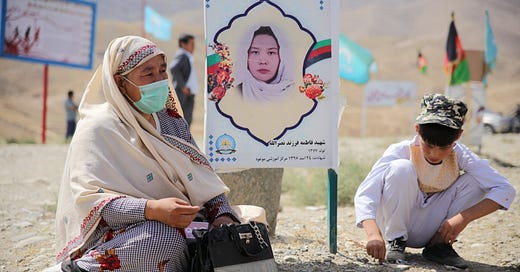Mawoud Academy a Place of Death—Security That Was Never Provided
Ambulances transport the injured and bodies to nearby hospitals in Dasht-e Barchi. Her charred body was identified at the forensic unit by the ring her mother had given her
By: Jumakhan Hamdard
His name is Rahman, from a remote and underdeveloped region of Afghanistan. He has an elder brother named Hadi and two younger sisters, Fatima and Zahra. Hadi served in the National Army, stationed in Helmand province in southern Afghanistan. Aware of life's hardships, Hadi encouraged Rahman to focus on his studies, often providing him with money to learn English alongside his school education.
Rahman’s elderly parents, worn by the struggles of life, had grown physically frail. They frequently complained of back and leg pain but nurtured high hopes for Rahman, urging him to pursue education and one day become a doctor. Sometimes, in jest, they would say, “Rahman, when you become a doctor, charge us less for treatment.” Smiling softly, Rahman would reply, “Inshallah, when I become a doctor, I will treat you and the poor in our community for free.”
After graduating from high school, Rahman moved to Kabul to prepare for the university entrance exam (Kankor). The harsh winter in Kabul, with its polluted, stifling air and damp, freezing rooms, was a tough adversary, but Rahman endured it. He worked tirelessly, determined to fulfill the dreams of his parents and family. Yet, the absence of news from his elder brother, Hadi, began to weigh on him. Hadi’s phone had been switched off for weeks.
Rahman attended his classes, but his thoughts were consumed with worry about Hadi. His fears were justified—Hadi had been killed in Helmand while serving in the National Army. His loss left Rahman devastated. With Hadi gone, Rahman had to bear the burden of supporting the family.
Forced by circumstances, Rahman abandoned his studies halfway and traveled to Iran to work, hoping to provide for his family and support his youngest sister’s education. Rahman took on Hadi’s role, encouraging and financially assisting his sister, Fatima, as she studied at the Mawoud Academy in Kabul to prepare for the Kankor exam. Fatima worked diligently, driven by the shared dream of fulfilling her parents' and her late brother’s aspirations.
Fatima frequently joked with Rahman during their video calls via IMO, saying, “Rahman, if I don’t register for the course today, they’ll kick me out. And if they do, you’ll have to deal with me!” Rahman would reassure her, “Don’t worry. My employer promised to pay me in four days. I’ll send money for you and the household expenses.”
Fatima said, “Fine, but if you can’t send it on time, I’ll sell the ring Mom gave me to pay for the course.” Rahman objected, “Don’t sell your ring. I’ll send the money in a day or two.” Fatima reluctantly agreed and headed to the Mawoud Academy with a mix of hope and apprehension, worrying that her unpaid tuition might cause her to be expelled from class. She entered the classroom and quietly sat down. The air inside was stifling. The physics instructor had just begun the lecture when a sudden explosion ripped through the room. The students were reduced to unrecognizable pieces. Many burned alive. Fatima was among those who didn’t survive.
Ambulances transport the injured and bodies to nearby hospitals in Dasht-e Barchi. Her charred body was identified at the forensic unit by the ring her mother had given her. Her relatives placed her remains in a coffin and transported her back to her ancestral village. After a grueling 17-hour journey, her dead body reached the home where her parents, already bowed by grief and hardship, received her lifeless body. Rahman, still in Iran, remained unaware of his sister’s death and tries for cash collecting. A friend of his, who knew the tragic details, falsely told him that the academy had temporarily closed due to the summer heat and that Fatima had traveled with his sister to the province. Rahman tried calling her but found her phone unreachable for two days, convincing him she was indeed traveling.
That evening, however, Rahman’s co-workers delivered the devastating news of Fatima’s death. Overwhelmed with shock, Rahman fell into deep depression, losing all motivation for work and life.
After a while, without informing his parents, Rahman decided to leave for Europe. When his parents learned of his departure, their worry grew, leaving them with nothing but prayers for his safety. His mother, frail and bent, visited the village mosque every night to pray for her son, while his father, now unable to walk, silently endured the pain. Months passed without any news from Rahman. Zahra, the youngest sister, recounted how her parents’ nightly sobs kept her awake, joining their grief with her own tears.
Five years later, Rahman’s parents succumbed to the weight of their suffering and passed away. Zahra, left alone in their humble mud-brick home, bore the brunt of life’s harshness. The once-young girl was now prematurely aged, her hair streaked with white, and her face etched with deep lines. She lived alone, her spirit broken, often talking or laughing to herself.
After seven years, Rahman, now a citizen of a European country, decided to visit his family, unaware of their fates. Wanting to surprise them, he traveled to Pakistan and then to Kabul, buying gifts for his parents and siblings.
When he reached his childhood home, he saw a woman with graying hair sitting outside, absentmindedly playing with her fingers. Upon seeing Rahman, she silently went inside. Confused, Rahman entered the house, expecting to find his family. Instead, he found only Zahra, whom he didn’t recognize at first. Finally, after introductions, Zahra said, “Rahman, you’re too late. My mom and dad, who dreamed of seeing you as a doctor, died of grief. I am your small sister, Zahra. I wish you hadn’t returned to see me with this bad situations…”





